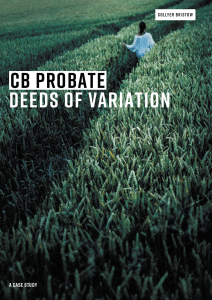
The Team
Our lawyers have the expertise and experience to provide you with creative, personalised solutions in a clear and understandable way.
Our Publications
Discover a wealth of invaluable guidance in the form of guides and brochures written by our expert lawyers.
Our insights
Discover the latest insights and thought leadership from our team of legal experts.
About
If the deceased left a will, it will name at least one executor. This person is responsible for winding up the deceased’s affairs. It is common to appoint two executors who must act together when carrying out the deceased’s wishes, but up to four executors can take on this role.
How does the process work?
Before they begin collecting and distributing the estate funds, the executor(s) must obtain a Grant of Probate. This is a legal document that confirms the executor’s authority to deal with the deceased’s property. After that, the process will vary depending on the complexity of the estate, the location of assets, and the instructions left in the will. It can include:
- Identifying and locating all the estate’s assets and debts
- Valuing assets
- Completing an inheritance tax (IHT) return and paying taxes due
- Selling or transferring ownership of property, possessions and money
- Paying the deceased’s debts
- Distributing the rest of the estate in line with the will.
At each stage, our team provides advice on the legal and practical aspects of dealing with the estate, ensuring all tasks are completed in a timely, cost-effective manner. We can also help to resolve disputes between executors or beneficiaries if required.
How do I obtain a Grant of Probate?
A Grant of Probate is a document issued by the Probate Registry. It gives an executor legal authority to begin sorting out the deceased’s estate.
Generally, it will take somewhere between 4 and 12 weeks to apply for a Grant of Probate. You will need to submit an application form and supporting documents to the Probate Registry, including an inventory of assets. This time is dependent on how long it takes to prepare an inventory and date-of-death valuations for the deceased’s assets. The bigger and more complex the estate, the longer this will take.
Once the application is submitted, it will generally take around 8 weeks for the Grant of Probate to be approved. This can be longer or shorter, depending on the Court’s workload.
How long does probate take?
Probate takes around 12 months in most cases. There are no time limits, however, so it could take longer or shorter depending on the complexity of the estate. Cross-border and multi-jurisdictional matters can take two years or more due to the extra paperwork and legal requirements involved.
There are time limits when it comes to Inheritance Tax. IHT must be paid by the executor by the end of the sixth month after the date of death. If this isn’t done, interest and penalties may be charged on late payments.
Sometimes, disputes between executors, creditors, beneficiaries or tax authorities can cause delays. Our team of probate solicitors can help resolve these quickly and efficiently, ensuring all deadlines are met.
How much does probate cost?
We offer a personalised service and the cost of probate will vary depending on the complexity of the estate. For example, our fees will be greater where there is more than property, disputes between beneficiaries, or assets located outside of the UK.
We are transparent about our rates and provide a full breakdown of our fees upfront, so you know exactly what to expect from us and can budget accordingly. Please visit our prices page to get a breakdown of our probate fees. If you’d like to discuss your situation and get a tailored quote, call us on 020 7242 7363.
How do you obtain probate if there is no will?
If there is no will, the deceased is said to have died intestate. Rules determine who can administer the estate and how they must distribute the inheritance. This person is known as an administrator and they are usually someone with close ties to the deceased, such as a spouse or adult child.
Instead of a Grant of Probate, Administrators must obtain a grant of Letters of Administration to prove they have the authority to deal with someone’s estate. The process for obtaining Letters is broadly similar to that for a Grant of Probate, but is slightly more complicated and may require additional paperwork. Our team can provide assistance with Letters of Administration to ensure everything runs smoothly.
Peter DanielPartner - Head of Private Wealth
+44 20 7468 7351+44 7879 842645peter.daniel@collyerbristow.com
Caroline HollisChartered Legal Executive (FCILEx)
Francis MerrittChartered Legal Executive
+44 20 7470 4529 +44 7947 532112francis.merritt@collyerbristow.com
Spotlight
Post death variations
Post death variations can help to achieve an outcome for succession and tax purposes which is in the best interests of the family and beneficiaries. We are often instructed by clients to redirect assets they have inherited by will or intestacy. These variations might include increasing individual cash legacies, ensuring that tax exemptions and reliefs are utilised, for example by varying the terms of an intestacy where the deceased was survived by their spouse and children.
Probate FAQs Publications
Resealing foreign grants of probate
Our experienced team offers you and your clients clear and competitive pricing and a clear and efficient timeline.
Deeds of Variation:A Case Study - A Case Study
A case study of how a deed of variation, if completed within two years of the date of death, can “change the narrative” of a will and/or the distribution of an estate generally to put the beneficiaries in a better position.
Valuations of Art:An overview - An overview
When administering an estate, the deceased’s personal possessions can often present challenges, both in terms of the disagreements among family members over sentimental items and valuing unique works of art or antiques. This guide explains more.
Cross-Border Estate Administration
Estates with cross-border aspects can present various complexities to be navigated. This guide provides an overview of the key issues and why it can be prudent to seek advice before proceeding.
Probate FAQs insights
Shorter Reads
The perils of making a fortune at a tender ageThe perils of making a fortune at a tender age
Read more
Longer Reads
Clitheroe v Bond case: providing clarity for practitionersClitheroe v Bond case: providing clarity for practitioners
Read more
Longer Reads
Making a success of UK-US cross-border estate planningMaking a success of UK-US cross-border estate planning
Read more
Shorter Reads
Q&A: My father has left his home to me and my siblings. What will it cost to buy out my siblings?Q&A: My father has left his home to me and my siblings. What will it cost to buy out my siblings?
Read more
Shorter Reads
Why you will no longer need to swear when visiting your solicitorWhy you will no longer need to swear when visiting your solicitor
Read more
Shorter Reads
Can my half-sister challenge our father’s will?Can my half-sister challenge our father’s will?
Read more
Need some more information? Make an enquiry below
Probate FAQs key contacts
- Peter
DanielPartner - Head of Private Wealth
Talk to Peter about UK trusts, tax & estate planning, International trusts, tax & estate planning, Private wealth, Probate and US/UK Tax & estate planning
Probate FAQs
Probate is the legal term for the entire process of managing a deceased person’s estate. This involves paying any debts owed by the deceased, paying inheritance and other taxes, and distributing their property, possessions and money according to their wishes. Probate ends with the estate being wound up and closed.
The Team
Our lawyers have the expertise and experience to provide you with creative, personalised solutions in a clear and understandable way.
Our Publications
Discover a wealth of invaluable guidance in the form of guides and brochures written by our expert lawyers.
Our insights
Discover the latest insights and thought leadership from our team of legal experts.
If the deceased left a will, it will name at least one executor. This person is responsible for winding up the deceased’s affairs. It is common to appoint two executors who must act together when carrying out the deceased’s wishes, but up to four executors can take on this role.
How does the process work?
Before they begin collecting and distributing the estate funds, the executor(s) must obtain a Grant of Probate. This is a legal document that confirms the executor’s authority to deal with the deceased’s property. After that, the process will vary depending on the complexity of the estate, the location of assets, and the instructions left in the will. It can include:
- Identifying and locating all the estate’s assets and debts
- Valuing assets
- Completing an inheritance tax (IHT) return and paying taxes due
- Selling or transferring ownership of property, possessions and money
- Paying the deceased’s debts
- Distributing the rest of the estate in line with the will.
At each stage, our team provides advice on the legal and practical aspects of dealing with the estate, ensuring all tasks are completed in a timely, cost-effective manner. We can also help to resolve disputes between executors or beneficiaries if required.
How do I obtain a Grant of Probate?
A Grant of Probate is a document issued by the Probate Registry. It gives an executor legal authority to begin sorting out the deceased’s estate.
Generally, it will take somewhere between 4 and 12 weeks to apply for a Grant of Probate. You will need to submit an application form and supporting documents to the Probate Registry, including an inventory of assets. This time is dependent on how long it takes to prepare an inventory and date-of-death valuations for the deceased’s assets. The bigger and more complex the estate, the longer this will take.
Once the application is submitted, it will generally take around 8 weeks for the Grant of Probate to be approved. This can be longer or shorter, depending on the Court’s workload.
How long does probate take?
Probate takes around 12 months in most cases. There are no time limits, however, so it could take longer or shorter depending on the complexity of the estate. Cross-border and multi-jurisdictional matters can take two years or more due to the extra paperwork and legal requirements involved.
There are time limits when it comes to Inheritance Tax. IHT must be paid by the executor by the end of the sixth month after the date of death. If this isn’t done, interest and penalties may be charged on late payments.
Sometimes, disputes between executors, creditors, beneficiaries or tax authorities can cause delays. Our team of probate solicitors can help resolve these quickly and efficiently, ensuring all deadlines are met.
How much does probate cost?
We offer a personalised service and the cost of probate will vary depending on the complexity of the estate. For example, our fees will be greater where there is more than property, disputes between beneficiaries, or assets located outside of the UK.
We are transparent about our rates and provide a full breakdown of our fees upfront, so you know exactly what to expect from us and can budget accordingly. Please visit our prices page to get a breakdown of our probate fees. If you’d like to discuss your situation and get a tailored quote, call us on 020 7242 7363.
How do you obtain probate if there is no will?
If there is no will, the deceased is said to have died intestate. Rules determine who can administer the estate and how they must distribute the inheritance. This person is known as an administrator and they are usually someone with close ties to the deceased, such as a spouse or adult child.
Instead of a Grant of Probate, Administrators must obtain a grant of Letters of Administration to prove they have the authority to deal with someone’s estate. The process for obtaining Letters is broadly similar to that for a Grant of Probate, but is slightly more complicated and may require additional paperwork. Our team can provide assistance with Letters of Administration to ensure everything runs smoothly.
Peter DanielPartner - Head of Private Wealth
View Peter Daniel's profileCaroline HollisChartered Legal Executive (FCILEx)
View Caroline Hollis's profileFrancis MerrittChartered Legal Executive
View Francis Merritt's profileNathania HallSenior Associate
View Nathania Hall's profileSPOTLIGHT
Post death variationsopen
Post death variations can help to achieve an outcome for succession and tax purposes which is in the best interests of the family and beneficiaries. We are often instructed by clients to redirect assets they have inherited by will or intestacy. These variations might include increasing individual cash legacies, ensuring that tax exemptions and reliefs are utilised, for example by varying the terms of an intestacy where the deceased was survived by their spouse and children.
Probate FAQs Publications
Probate FAQs insights
Shorter Reads
The perils of making a fortune at a tender ageThe perils of making a fortune at a tender age
Read more
Longer Reads
Clitheroe v Bond case: providing clarity for practitionersClitheroe v Bond case: providing clarity for practitioners
Read more
Longer Reads
Making a success of UK-US cross-border estate planningMaking a success of UK-US cross-border estate planning
Read more
Shorter Reads
Q&A: My father has left his home to me and my siblings. What will it cost to buy out my siblings?Q&A: My father has left his home to me and my siblings. What will it cost to buy out my siblings?
Read more
Shorter Reads
Why you will no longer need to swear when visiting your solicitorWhy you will no longer need to swear when visiting your solicitor
Read more
Shorter Reads
Can my half-sister challenge our father’s will?Can my half-sister challenge our father’s will?
Read more
Need some more information? Make an enquiry below.
Message us on WhatsApp (calling not available)
Please note that Collyer Bristow provides this service during office hours for general information and enquiries only and that no legal or other professional advice will be provided over the WhatsApp platform. Please also note that if you choose to use this platform your personal data is likely to be processed outside the UK and EEA, including in the US. Appropriate legal or other professional opinion should be taken before taking or omitting to take any action in respect of any specific problem. Collyer Bristow LLP accepts no liability for any loss or damage which may arise from reliance on information provided. All information will be deleted immediately upon completion of a conversation.
Close


























